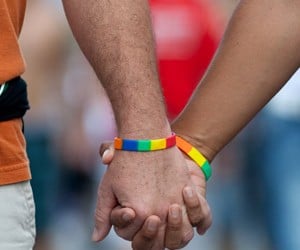
For the sake of one future bride: Being gay is not an off/on switch
This article first appeared in Malta Today
To understand the social media reaction to his statements, one needs to first know exactly what was said in the much-discussed video of X Factor Malta contestant Matthew Grech. To put you in the picture, here is a transcript of the interview:
“I was a homosexual and after I found my faith in Jesus Christ, I learned to really appreciate the design which God created, that of creating marriage between a man and a woman. Anything which is outside the context of marriage is not God’s will and therefore falls under the category of ‘sin’. This does not mean that two men or two women cannot love one another, but it depends what kind of love. Maybe there are those who have understood the Biblical message wrongly about sexuality and marriage, so they ask you ‘why can’t two men or two women love each other’? But sexual love is reserved only for a man and a woman who are married in Christ. Now this message does not apply to those who don’t have God in their lives, this message is only for those who want to live their lives in God’s righteous path…Right now I am single and happy, but I am open to getting married to a woman who will be the love of my life.”
Because Malta is so small and we all know each other, or have a cousin who does, it did not take long for many to immediately point out that Mathew Grech belongs to the River of Love, a Christian Fellowship which advocates gay conversion therapy. Inevitably, the video led to an uproar from the gay as well as heterosexual community, because although he did not actually come out and say so, the undertones of Matthew’s message were clear: finding religion made him see the ‘error of his ways’ and realize that his sexual orientation was sinful. As Malta made gay conversion therapy illegal in 2016 (the first EU country to do so), Matthew’s statements could arguably be construed as having broken the law.
The Affirmation of Sexual Orientation, Gender Identity and Gender Expression Act “imposes fines and jail terms for anyone advertising, offering, performing or referring an individual to another person which performs any form of conversion practice. In addition, the law affirms that no sexual orientation, gender identity or gender expression constitutes a disorder, disease or shortcoming of any sort.”
Demands were made to boycott X Factor Malta, or have them issue an apology – the YouTube video which had appeared on FB was swiftly taken down. In fact X-Factor Malta issued a statement saying that “no part of Matthew Grech’s original audition was intended to cause offence, nor were the views expressed those of the programme.”
However, apart from the uproar, I also read comments by those who were more circumspect and wondered why Matthew did not have the right to express his own beliefs, even though they may have teetering on the edge of a ’religion cured me of my homosexuality’ type of pronouncement. Surely, they argued, he had a right to say what his own life experience was, without it being interpreted that he was promoting it, or urging others to do the same? A part of me agrees with this line of reasoning – one is free to agree with Matthew or dismiss what he is saying as hogwash, but does anyone have the right to censor him?
On the other hand, those who were greatly upset by the interview made some valid points: namely that young people watching who were discovering their sexual orientation may have been influenced by Matthew’s statements, leading them to think of themselves as having something sinful or wrong with them, which needed to be “treated”. More significantly, their parents might also get the same idea, which is where the real problems lie as there have been cases where family members have tried to treat homosexuality as a dysfunction which simply needs to be cured. Although our Church attendance figures have gone down drastically, one should not under-estimate the influence which religion still holds over many people’s psyche.
However, where I parted ways with Matthew’s statements was when he categorized those who are gay into two separate categories: namely, those who have God in their lives (who should only have platonic relationships) and those who do not. I happen to know quite a few gay people in intimate, loving relationships who are extremely devout – and they feel perfectly comfortable and see no contradiction whatsoever. Frankly, neither do I. With so much hate in this world, why should God chastise those who are in love and care deeply for one another, expressing their love in a sexual relationship, no matter their gender?
Ultimately, the part in Matthew’s interview which troubled me the most was when he spoke about one day getting married (to a woman). Everything he said up until then can be interpreted as someone who has found spiritual meaning in his own life, and who has reconciled his sexual yearnings with his religion. But, when he spoke about eventually finding the woman of his dreams, I had serious misgivings, because the bottom line is: no matter how much one may try, no matter how much one prays and no matter how much one may want to believe it is possible, one cannot just switch one’s sexual orientation off and on like a switch to suit the circumstances. For his own sake, but mostly for the sake of this yet unknown woman, I hope he does not marry her, because I honestly believe that would be a terrible mistake which would ruin both their lives.
- October 25, 2018 No comments Posted in: Hot Topics Tags: Matthew Grech, X Factor Malta, gay conversion therapy, sexual orientation





